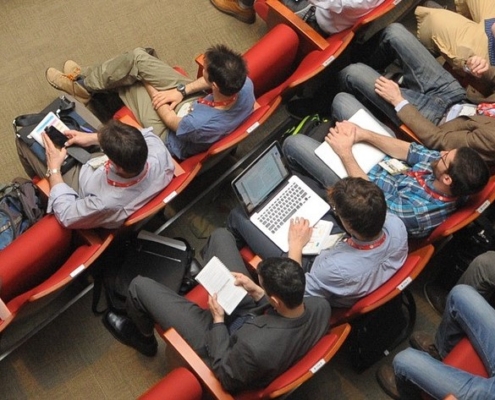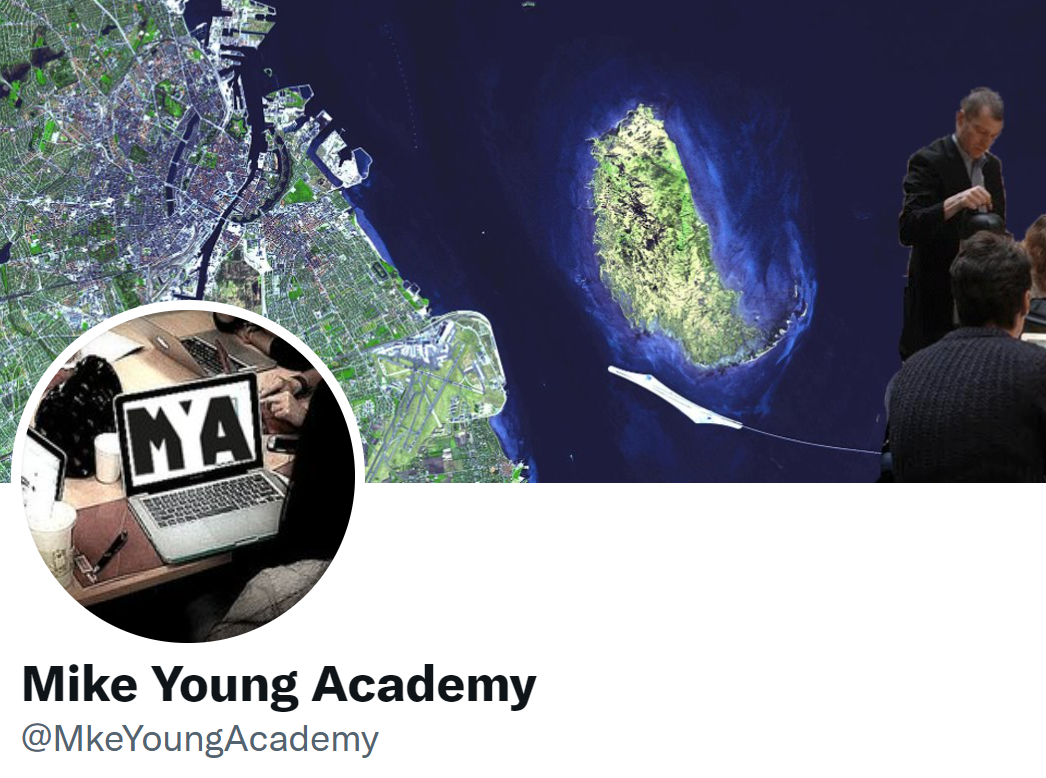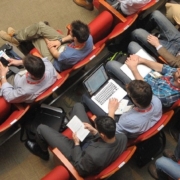Why do I tweet about lectures, webinars and conferences?
The philosophy behind the @MkeYoungAcademy Twitter account.

Online or in-person: People need to be made aware of lectures and conferences, even if they are not directly within their own field of research.
Many years ago, one of the cool things I remember from starting university was that you could go to any lecture that caught your fancy — anywhere on campus — on any subject.
My student days started on an anthropology programme: but I soon found out that I could sit in on lectures in history, philosophy and even a course on beginners’ Ancient Greek, no questions asked.
Academic silos not only go against Humboldt’s ideal model of what a university should be, they undersell invited speakers and lecturers. They are, frankly, a waste of taxpayers’ money.
Later, when I returned to academia as editor for the University of Copenhagen’s University Post, I was struck by how much of the university’s intellectual life and energy was cooped up in small academic silos. Many university departments and subjects made no concerted effort to attract an outside following for lectures. The underlying assumption was that lectures, even with esteemed invited international scholars and public intellectuals, are too technical and complicated for other subject areas to understand, never mind a lay public. Keeping it all in-house helps demarcate the department’s academic and social identity, and ensures that you know exactly how many people (five!) are coming to the lecture, so the organiser knows exactly how many packets of cookies to buy for the snack table.
But these academic silos not only go against Humboldt’s ideal model of what a university should be, they undersell the value of invited speakers and lecturers. They are, frankly, a waste of taxpayers’ money.
Luckily, the guerrilla culture of sitting in on other fields’ lectures still exists among students and researchers. My ambition was that the @MkeYoungAcademy Twitter account would harbour and foster it.
Later, when I started tweeting about upcoming events at Danish universities, I realised I was also pushing for a culture change. Students, PhD students and more senior scientists need an overview of the full programme of lectures, conferences and events. I felt that the students and scientists should ‘shop’ between academic specialties, at least in their choice of lectures and events. This is what makes the university system great.
Here below is a typical tweet from my account. To ensure people can scroll and skim the events, I try to keep my own tweets in almost the same format with lecture first, then date, then organiser, then tags. Creative? Not really. But effective:
‘Early Modern Notions of Privacy and the Private’- conference will be 2 – 4 June and is organised by @privacy_ku @GrundforskFond . Call for proposals + info: https://t.co/ugOGcmkSAK @HistoryElaine @FJNevola pic.twitter.com/DWESqxnin8
— Mike Young Academy (@MkeYoungAcademy) January 27, 2021
Some universities are good at ensuring that all lectures and events are put up on academic calendars and widely disseminated — but others are useless, and seem to rely on word-of-mouth. I will not name names, but I do wonder why. A university-wide calendar is technically easy to implement. It adds value to the departments or centres that organise the events, to the invited speakers, and to the participating academics in related fields. And it serves as an outreach to a lay public.
Luckily, the guerrilla culture of sitting in on other fields’ lectures still exists among students and researchers. And when I started up on my own in 2016 my ambition was that the @MkeYoungAcademy Twitter account would harbour and foster it.
Then the corona pandemic put a stop to physical lectures, seminars and conferences throughout the globe. But this guerrilla culture has, if anything, been reinforced. ‘Fifth columnists’ from other fields and universities can now easily take part on Zoom lectures in specialty fields throughout the globe. All they have to do is register and get the link.
As to how many students and scientists actually do shop around for interesting lectures in related fields on the other side of the world during the corona pandemic, is, as far as I know, an open question, and I am looking forward to the studies that document it. But the culture should, if anything, have been reinforced.
I run this account as a hobby, for no reason except that I enjoy it.
My hypothesis is that while the total amount of university lectures, seminars and conferences dropped sharply during the pandemic, the greater potential reach of those that are organized as online webinars ensures that there is a wider, more geographically dispersed, and diverse range of participants.
 I run this account as a hobby, for no reason except that I enjoy it. Once in a blue moon, someone who has seen a tweet or retweet orders one of my courses, but the account is not an effective ‘marketer’ of my services and I have not conceived it as one.
I run this account as a hobby, for no reason except that I enjoy it. Once in a blue moon, someone who has seen a tweet or retweet orders one of my courses, but the account is not an effective ‘marketer’ of my services and I have not conceived it as one.
I have set up a good routine for it to make things easier for me. This includes various feeds and monitoring tools that suggest events that I can tweet and retweet. I also schedule tweets on Tweetdeck so that I can concentrate on my other work.
As from August 2021 the account will extend its range, move beyond Denmark, and tweet about interesting lectures, webinars and conferences throughout the Nordic region. I hope that this extension of range does not set off an exodus among my already existing followers!
Feel free to tip me off about an upcoming event by mentioning @MkeYoungAcademy in a tweet, or sending me a direct message.
You can follow the Twitter account here: Follow @MkeYoungAcademy
Does your department, faculty or university need to boost its researchers’ international impact? My workshops in social media introduce researchers to the systematic use of Twitter, LinkedIn and other specialized social media and tracking applications. All Mike Young Academy workshops are bespoke and custom-fitted to specific scientific fields. In the event of lockdown in connection with Covid-19, workshops are easily moved online as a combination of video-conferenced live-sessions with group ‘breakout’ rooms, individual feedback, and homework.

 Creative Commons license
Creative Commons license

Leave a Reply
Want to join the discussion?Feel free to contribute!